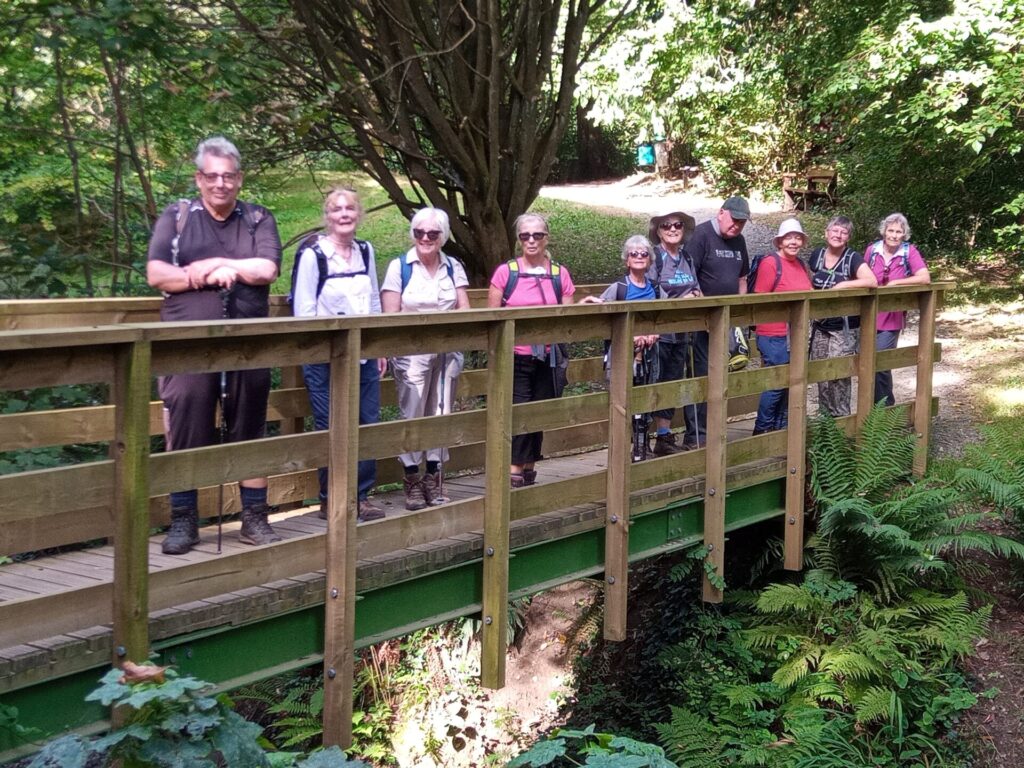
We have over 1,000 u3as in the UK and walking is one of the most popular activities.
From striders and mountain walkers to short social ambles. We have it all. Many u3as have several walking groups offering different types of walks, varying in distance and difficulty.
Collectively we have a vast variety of walks on offer. The walking exchange scheme makes use of this massive resource.
What Is the Walking Exchange Scheme?
The u3a Walking Exchange Scheme connects u3a walking groups, giving members the chance to explore new routes and regions. Whether it’s a short visit, a day walk with a neighbouring u3a, or a longer holiday, this is a great way to combine walking with travel and connection.
How It Works
- Open to all u3a members
- Participating u3as offer to share their favourite walks
- Visitors arrange their own accomodation and transport
- Host groups guide the visiting members on local walks
- Ideal for day trips, mini-breaks or walking holidays
Getting Started
The u3a Walkers Exchange allows one u3a Walking Group to request guided walks from another u3a.
If your group is interested in walking in a different part of the UK, the Walking Subject Adviser Team try to match you with a suitable host u3a. Once a match is found, the team will share contact details so the two u3as can liaise directly and plan the exchange.
Responsibilities
Visitor u3a – Pre-walk Planning
Provide details of the type of walks your group would like, including the:
- Distance
- Difficulty
- Duration
Highlight any specific places or points of interest you'd like to include.
Once a walk is agreed upon, review the risk assessment and confirm how many members will take part.
Organise transport to the starting point (e.g., car sharing or arranging overnight stays if needed).
Host u3a – Pre-walk Planning
Appoint Walking Group Leaders who are happy to lead visiting groups.
Prepare a selection of walk options, ideally showcasing scenic or interesting local features.
Offer walks that match the visiting group’s preferences where possible, including any limits on group size.
Survey the walk(s) in advance and provide:
- A detailed route overview
- A Risk assessment
- Terrain and conditions (e.g. number of stiles, elevation)
- Estimated time to complete
- Directions to the starting point (from the visitor group's accommodation or travel route)
On the Day of the Walk
Walkers can choose to carry an ICE card (In Case of Emergency) with their personal emergency details.
The Host u3a should provide a leader to lead the walk. If possible, a back marker should also be provided.
The pace of the walk should be inclusive and suitable for everyone attending.
FAQs
How do we know walks will be suitable?
It is really important to discuss the fitness and abilities of your group with the host walk leaders AND for the hosts to fully describe the walks they are prepared to offer. Distance and elevation are important but also terrain, speed of walking, difficult areas, weather problems, equipment needed such as poles etc. It is best not to make assumptions even for example, proper walking boots or shoes are essential. If it is not a good match, it is better not to go ahead and seek another area that is. Telephone and video discussions will help and sharing the walking risk assessment. We suggest the visitors provide a back marker who has knowledge of the group.
We don’t have enough people wanting to do holidays in our u3a. Can we merge with another u3a?
Yes. The whole scheme is about co-operation nationally.
Are we insured?
Walking is generally insured for u3a members as long as a risk assessment has taken place. Please refer to the Insurance FAQs.
Do we have to stay away? Can we do a day visit instead?
It is fine to arrange walks just as a day trip. Some walks may be within a reasonable travelling district of your local u3a.
What accommodation would you recommend?
It is up to your group. Some budget hotels allow you to cancel up to 1pm on the day of arrival which is useful if severe weather is forecast. They can be better value for single rooms. You can compare prices before fixing dates.
Some groups travel with a coach trip but then go walking instead of the organised tours. Good public transport will be needed at the destination. Non walking partners can still do the coach tours.
If you prefer luxury, it is worth checking what else you can do if it’s not suitable to walk.
Consider how you will get to your destination. Car sharing will need parking or whether the accommodation is close to public transport etc
Consider meals. Do you want dinner included? Some budget hotels do meal deals and have a restaurant on site. How far away are restaurants? Group bookings in restaurants require deposits and people may want to eat at different times. Is there somewhere to get sandwiches for lunch or will the walks include a café?
You may find the trip easier to manage if everyone books their own accommodation once the dates and location are agreed.
What is the host responsible for?
Please see our suggested guidelines. Some areas are willing to suggest local hotels and other information but not all.
We don’t mind hosting another u3a but we are not interested in going away. Can we still join?
Absolutely! Although it doesn’t work the other way. If you want to visit other areas, you must be prepared to host other u3as.
We want to visit an area not on your list. Is this possible?
We are still trying to spread the word. We may be able to help by contacting areas not currently listed to promote the scheme.
Do we always need to exchange?
No, some areas may be willing to host you but not want to visit your area. This is fine. If you are doing a return visit, you may want to establish in the early stages of discussion how this would work.
Can we refuse an exchange?
The scheme is completely voluntary and relies on cooperation. Some areas may be overwhelmed with requests in desirable tourist areas and National Parks. It is totally understandable if they want to limit exchanges in number and to give preference to areas they want to visit.
Can our own members join the walks?
Yes, this is positively encouraged but ensure the group sizes remain manageable.
We don’t want to walk every day. Is this OK?
Most groups will want to do some sightseeing as well as walking. It may also be too much for some people to walk on consecutive days. Hopefully your host can also tell you about local places of interest.
How long can we stay?
You will need to discuss with your host how many walks they are prepared to lead. If you want to do sightseeing in an area, the host may be happy to have some days off walking during your stay. Some hosts may be willing to offer a single day or half day of walking without an overnight stay.
What happens if the host walk leader needs to drop out?
Unfortunately. things can crop up and go wrong. Hopefully the host can find someone else to lead you or we can try to contact surrounding u3as to see if they can help. However, the scheme is voluntary and in the worst case, you may need to find your own walks. Hopefully this will not be necessary. Have you added this to your risk assessment or contingencies?
What about car sharing?
Car sharing can be useful for small groups to get to and from u3a events. Please refer to the insurance FAQs which covers further information about car sharing.
Do you need to know if we do an exchange?
It is really useful to hear from you about successes and anything we can learn from. We would love members to share pictures and stories from their walking exchange.
Where can we get further advice?
Let us know if you would like to know more. We can put you in touch with someone who has been involved in the exchange scheme. If you have any questions relating to insurance, risk and or finance, please contact the u3a office on info@u3a.org.uk or calling 020 8466 6139.
To join the scheme sign up here......
